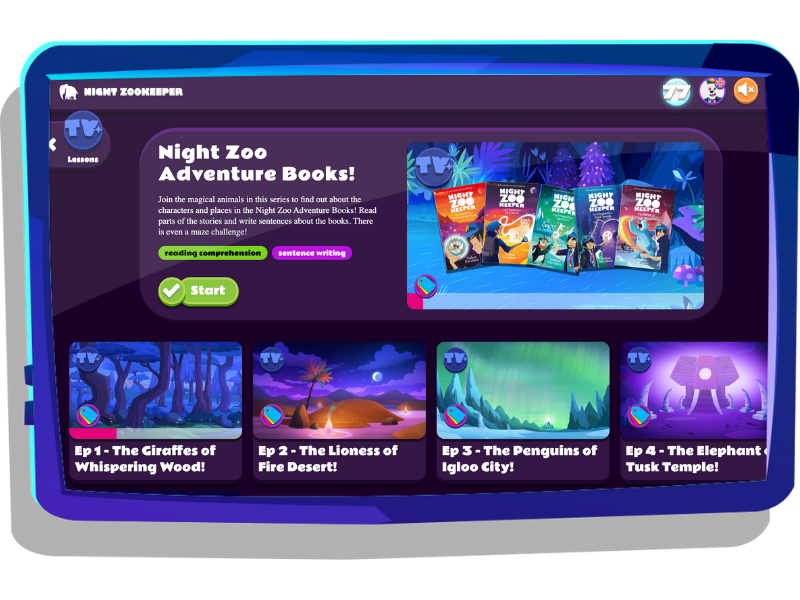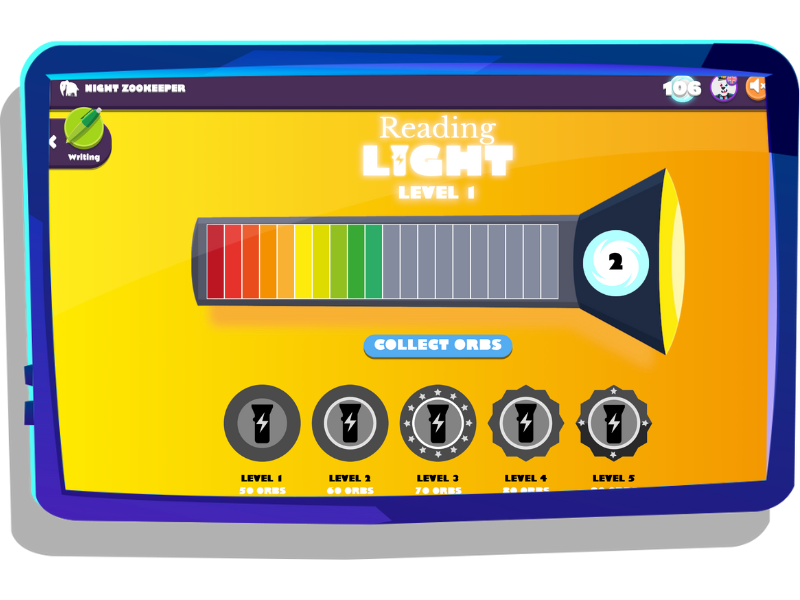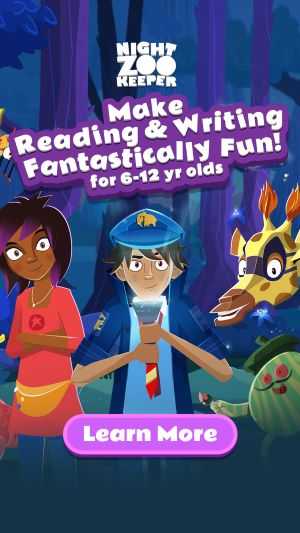Grade 4 Reading
Discover Grade 4 Reading Standards

Home > Language Arts > Reading > Grade 4
In fourth grade, the way children approach reading will be completely different from their approach in first grade. They’ll be well-versed in key language arts principles, should be fluent readers and recognize a wide variety of words instantly.
Here’s a short summary of the basic elementary reading skills your children should have by fourth grade level:
- Recognize all of the sight words they learned in Grades 1-3.
- Summarize the key ideas in a story and recite these to you.
- Use their reading comprehension skills to understand the meaning of an unfamiliar word within a sentence, text, or story.
- Discuss the main details within a story or informational text. For example: make observations about the motivations of a character.
- Identify the differences between different text types, such as: narrative, non-fiction, poetry, instructional texts.
- Compare and contrast key ideas between different texts.
The challenge for your fourth grade child will now be to make the switch from simply being able to read the words on the page, to applying their reading comprehension skills to think critically about what the text is telling them. To ensure they’re heading in the right direction, they’ll also need to begin to inference and answer comprehension questions by identifying hidden meanings. This can be a challenging step for a lot of children, so it’s important to practice as much as possible at this reading level!
Word Reading
By the time children have reached fourth grade, they’re expected to use a full toolkit of reading skills to decode words. These skills include knowing phonics, syllabication patterns, and knowledge of affixes.
Letter-sound correspondences or phonics are the sounds that relate to individual letters and letter combinations. Syllabication patterns help children to read multisyllabic words by breaking them into syllables. Affixes are the letters we add to root words that change their meaning, such as prefixes and suffixes.
Some examples of words your child should know at fourth grade level are:
- persuade, glimpse, recommend, hibernate, represent, sensitive, parallel, observe, distribute, migrate, destructive, calculate
Reading Literature
In Grade 4, children are expected to make use of the reading comprehension skills acquired in previous grade levels to explain inferences within a text. Where appropriate, they should make textual references and give examples. You can help your child develop reading comprehension and inference skills by reading children’s stories, and prompting them to answer questions on “why” something happened in the story. Here are a few examples:
- Why did the character say that?
- Why did they travel to that place?
- Why were they feeling happy in chapter 2?
If your child is struggling to infer meanings in stories, then you can try to compare the events to something they may have experienced in their own life. This can help them to relate to the story and it can make the events more understandable.
Practice Tip
Set up your own book club! This is a great way to challenge your child to read stories and give them the opportunity to answer questions based on what they’ve read. The Night Zookeeper books are great reads, and there's even a reading comprehension lesson series based on them!

Reading Informational Text
A large part of the elementary reading curriculum in fourth grade will involve non-fiction texts. Children will be expected to read through a text and identify key ideas and pieces of information. It’s important to be very clear with your child as to what they should be looking for in the text before they begin reading. If they don’t have a clear purpose for their non-fiction reading, then it can be difficult for them to extract important information from the text.
It will also help your child to go through the key words in the text before they begin reading. This can involve picking out four to eight words that are key to understanding the information in the text. You should run through the meaning of these words, ask your children to read them aloud and ask them to explain their meaning to you. You might even invite your children to find these key words and consult a dictionary to understand their meanings before they start reading.
Children in fourth grade will also be expected to build upon the ‘compare and contrast’ skills they started to develop whilst in third grade. When reading informational texts, you can ask your child to compare how different authors present their information on a topic. You can also ask for their critical opinion on which text they prefer and ask for them to back this up with reasons.
Reading For Pleasure
The best way to practice reading and all of your fourth grader’s new skills is by making it fun! Children always learn best when they are enjoying themselves and that’s why it’s important to encourage them to read for pleasure. Allow them to select their own books, read things that interest them, and introduce fun activities around the books they are reading.
Here are just a few fun activities you could do with your young reader at home:
- Reader's theatre: When you read aloud with your children, ask them to perform as one of the central link to characters in the story. This will ensure that they are following along with the story and understanding when it is their turn to speak.
- Character interviews: When you’ve finished reading a book with your child, ask them to assume the role of a character in the book. Ask them questions and they must answer from the character’s point of view. If they’re struggling to answer any of your questions, allow them to use the book as an answer key - this will further improve their ability to identify important information within a text.
- Creating artwork: Challenge your child to create a piece of artwork based on a book they’ve read. This will demonstrate their reading comprehension skills, as they have to decode information from the text to be able to draw the book characters and settings.
- Make a film: You could record your children performing the story that they have just read together with you. Challenge them to tell the story in under five minutes. This is a valuable transferable skill where they are learning how to distill a long text into only the most important parts.
- Reward their reading time: Ask your children to record their reading on a chart or using an online reading record tool. Reading Light on Night Zookeeper allows children to record each reading session and score game points based on the length of time they have read for.

How Night Zookeeper can help

Night Zookeeper is a language arts program that focuses on helping children develop their reading and writing skills in a fantastically fun way!
Our program provides countless ways for your fourth grade child to develop key reading skills, including reading comprehension activities and lessons, word games, and reading challenges. Night Zookeeper includes an adjustable grade level feature, to allow children to learn at their own pace, so if you feel that your child needs a little extra practice, we’ve got you covered!
Sign up today to get a free 7-day trial!
Related articles


Make Reading & Writing Fantastically Fun!
- Award-winning reading & writing program for kids
- Improves spelling, grammar, punctuation & vocabulary
- Over 1,000 different learning games and activities



